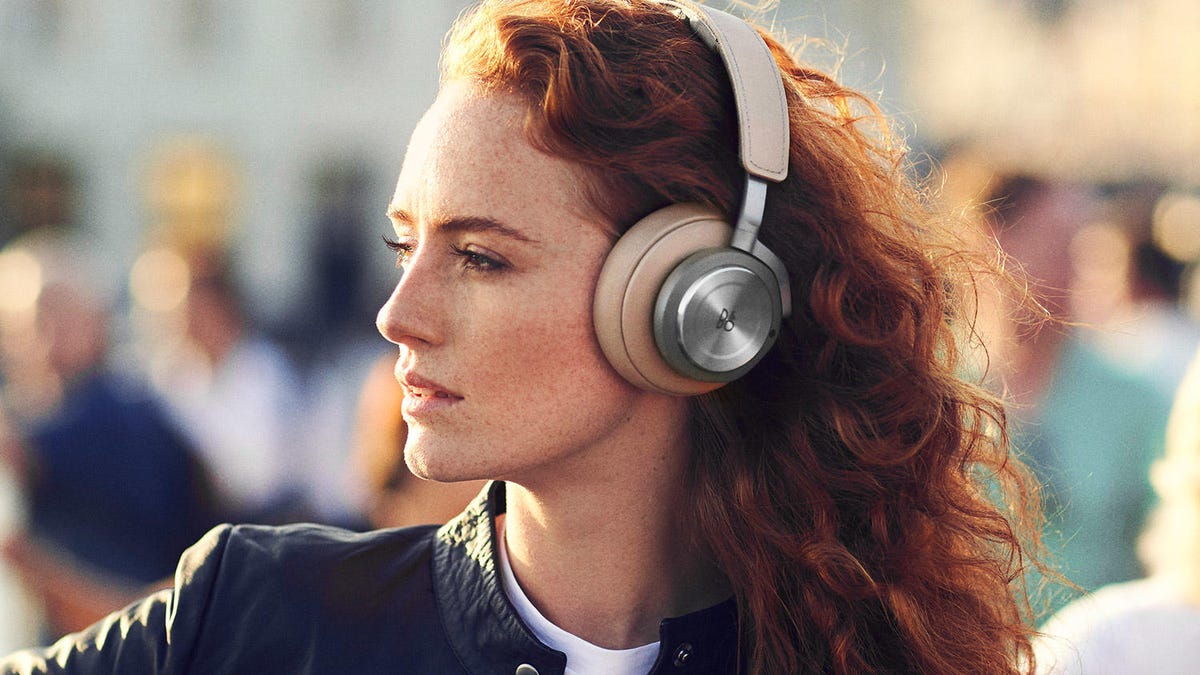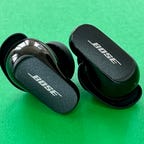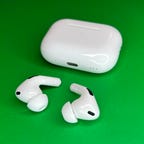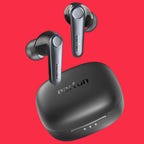Best Noise-Canceling Headphones of 2023

Sony WH-1000XM5
Best over-ear noise-canceling headphones

Bose QuietComfort Earbuds 2
Best noise-canceling in-ear headphones

Apple AirPods Pro 2
Best Apple noise-canceling wireless earbuds

Earfun Air Pro 3
Best budget noise-canceling wireless earbuds
Bose QuietComfort 45
Best noise-canceling headphones from Bose
Apple AirPods Max
Best Apple over-ear noise-canceling headphones
Sennheiser Momentum 4 Wireless
Best noise-canceling headphones from Sennheiser
Technics EAH-AZ80
Great-sounding Technics noise-canceling wireless earbuds
Sony WF-1000XM4
Excellent all-around ANC wireless earbuds
Sony WH-1000XM4
Best older model noise-canceling headphones
Bowers & Wilkins PX7 S2
Next-gen Bowers & Wilkins noise-canceling headphones
Samsung Galaxy Buds 2 Pro
Best Samsung noise canceling wireless earbuds
1More SonoFlow
Good performing noise-canceling headphones under $100
Beats Studio Buds Plus
Second-gen wireless earbuds from Beats
Anker SoundCore Life Q30
Top budget noise-canceling headphones
The best noise-canceling headphones (or best “noise-cancelling” headphones as some companies spell it) tend to cost more than $200, with some premium models like the AirPods Max costing well north of that. But fear not — you can also find good noise-canceling headphones and earbuds with great audio performance at more affordable prices, and I’ve included some top budget noise-canceling picks on this list. If you’re just looking for a list with only budget noise-canceling headphone picks, check out our best noise-canceling headphones under $100 list. And we also have a list of best noise-canceling true wireless earbuds for those just looking for top noise-canceling earbuds.
What are the best noise-canceling headphones right now?
There’s a lot of debate around this question, and it’s hard to name one single model as the best overall noise-canceling headphones. But a few models do stand out a bit from the rest of the pack, which is why we’ve given them our prestigious CNET Editors’ Choice Award. From 2022, these include the Sony WH-1000XM5, Bose QuietComfort Earbuds 2 and Apple AirPods Pro 2 and I’m sure we’ll see some worthy Editors’ Choice candidates arrive in 2023. These headphones and true-wireless earbuds (aka in-ear headphones) offer not only offer excellent ambient noise-muffling capabilities but a comfortable fit, very good sound and strong voice-calling performance. Those are the key factors I evaluate when determining what products end up on this list. Pricing is also a consideration for value picks.
I’ve fully reviewed or had hands-on listening time with all the devices on this best noise-canceling headphones list. My recommendations are updated regularly as I test the new models hitting the market.
Best noise-canceling headphones of 2023
Battery Life Rated up to 32 hoursNoise Canceling Yes (ANC)Multipoint YesHeadphone Type Over-ear wireless headphonesWater-Resistant No IP rating
When you have a product that a lot of people love, change can be risky. Such is the case for Sony’s WH-1000XM5, the fifth generation of the 1000X series headphones, which were first released in 2016 as the MDR-1000X Wireless and have become increasingly popular as they’ve improved with each generation. Over the years, Sony has made some tweaks to the design, but nothing as dramatic as what it’s done with the WH-1000XM5. Other than the higher $349 price tag most of those changes are good, and Sony’s made some dramatic improvements with voice-calling performance as well as even better noise canceling and more refined sound.
Read our Sony WH-1000XM5 review.
Battery Life Rated Up to 6 HoursNoise Canceling Yes (ANC)Multipoint NoHeadphone Type Wireless EarbudsWater-Resistant Yes (IPX4 — Splash-Proof)
Bose’s second-generation QuietComfort Earbuds 2 are not only about 30% smaller than their predecessors, but their case is about 40% smaller and truly pocketable. They feature best-in-class noise canceling and improved sound, thanks to Bose’s new CustomTune sound calibration system that customizes the sound for your ears. Voice-calling performance is also significantly better than that of the original QuietComfort Earbuds.
The other big change is to the ear tips. Bose has ditched its one-piece StayEar wing tips for a two-piece Fit Kit system that features separate ear tips and “stability bands” in three size options, giving you more flexibility to get a secure fit and tight seal.
Read our Bose QuietComfort Earbuds 2 review.
Battery Life Rated up to 6 hoursNoise Canceling Yes (ANC)Multipoint NoHeadphone Type Wireless earbudsWater-Resistant Yes (IPX4 — splash-proof)
Available for preorder now and shipping Sept. 23, the new AirPods Pro (2nd Generation) are powered by Apple’s new H2 chip, which delivers more processing power while being more energy efficient, according to Apple. The new chip, combined with new low-distortion drivers, allows for improved sound that offers better clarity and depth. The noise canceling is also improved — Apple says the new AirPods have “double” the noise canceling of the original AirPods Pro. Additionally, the new AirPods add an extra hour of battery life — it’s up from 5 to 6 hours with noise canceling on — and a speaker in the case that emits a sound that helps locate your buds via Find My should they decide to hide from you.
Note that while Apple has discontinued the original AirPods Pro, they’ll remain on sale at discounted prices until supplies are exhausted. However, most people should get this newer model if they can afford it.
Read our Apple AirPods Pro 2 review.
Sony’s improved entry-level noise canceling headphones, the CH-720Ns, have a bit of a plasticky budget vibe, but they’re lightweight and very comfortable. Part of me was expecting them to sound pretty mediocre, but I was pleasantly surprised. No, they don’t sound as good as the WH-1000XM5s. But they sound more premium than they look (and feel), and their overall performance is a step up from their predecessor, the CH-710Ns. Are they worth $150? Maybe — or maybe not. But the good news is that, like the CH-710N and WH-XB910 before them, these should see significant discounts in the not-so-distant future, which is what you may want to wait for.
Read our Sony CH-720N review.
Earfun has put out a series of wireless earbuds over the last couple of years with one important commonality: They’re very good values, made more so by frequent discounts. The company’s new-for-2023 Earfun Air Pro 3 earbuds feature the latest Qualcomm QCC3071 system-on-a-chip with aptX Adaptive for Android and other devices that support the new LE Audio standard and LC3 audio codec, which is superior to the SBC codec (they also support AAC for Apple devices).
Lightweight and comfortable to wear — I got a good seal with the largest ear tip size — these aren’t a huge upgrade over the Earfun Air S, but they are better. They have slightly larger wool-composite drivers (11mm versus 10mm), slightly improved noise canceling and better battery life (up to seven hours with noise canceling on, according to Earfun).
In short, the Earfun Air 3 deliver strong performance for their modest price, with robust bass, good clarity and a relatively wide soundstage. They also pack in a lot of features, including a wireless charging case and “multidevice” connectivity. (I could pair them to two devices simultaneously but had to pause the music on one device and hit play on the other for the audio to switch.) They’re IPX5 splash-proof and also work well (though not exceptionally well) as a headset for making calls.
Note that after you activate the instant coupon at Amazon, adding the code EAP3CNET at checkout gives you additional savings, bringing the buds’ price down to $56.
Read our Earfun Air Pro 3 review.
Battery Life Rated up to 25 hoursMultipoint YesHeadphone Type Over-ear wireless headphonesWater-Resistant No IP rating
The Bose QuietComfort 45 essentially look the same as their popular predecessor, the QuietComfort 35 II, with the biggest design difference being a USB-C port in place of the older Micro-USB. (At 238 grams, the QC45 weigh just 3 grams more than the QC35, which should be imperceptible.) And while the Bose 700 have plenty of fans, a lot of people, including me, think this QuietComfort design is slightly more comfortable and the headphones fold up and fold flat. They’re arguably the most comfortable pair of headphones out there.
They also sound very similar to the QC 35 II, with no change to the drivers. Where you’ll see an improvement is with the noise cancellation (there’s a transparency mode), which very well could be the best out right now. According to Bose, there’s a new electronics package that powers the new ANC system, which now better muffles “unwanted sounds in the midrange frequencies” (voices) that you’d “typically find on commuter trains, busy office spaces and cafes.”
I found that to be true and give these the slight edge over both the Headphones 700 and Sony WH-1000XM4 for noise canceling. That said, you can’t adjust the level of noise canceling like you can with those models, which offer a more robust feature set, particularly the Sony. However, after a firmware update, you can now tweak the sound in the app with equalizer settings.
The headset performance has also improved, with better noise reduction during calls. And these offer multipoint Bluetooth pairing. That means you can pair the QC45 with two devices simultaneously — such as a smartphone and PC — and switch audio as needed. They’re equipped with Bluetooth 5.1 and support the widely compatible AAC audio codec but not aptX.
While these have advantages over the Headphones 700 and Sony WH-1000XM4 and do sound quite good, those models sound slightly better: The 700 is slightly more natural sounding and tuned more for audiophiles, while the Sony has more dynamic bass. So that makes choosing between these three models that much more difficult.
Battery Life Rated up to 20 hoursNoise Canceling Yes (ANC)Multipoint NoHeadphone Type Over-ear wireless headphonesWater-Resistant No IP rating
Yes, they’re expensive, but the AirPods Max deliver richer, more detailed sound than lower-priced competitors from Bose and Sony. They also feature arguably the best noise canceling on the market along with premium build quality and Apple’s virtual surround spatial audio feature for video watching. While they’re heavy, they manage to be surprisingly comfortable, though I did have to adjust the mesh canopy headband to sit a little more forward on my head to get a comfortable secure fit when I was out walking with them. They should fit most heads well, but there will be exceptions.
Read our Apple AirPods Max review.
Sennheiser’s previous-generation Momentum Wireless headphones have always had a pretty distinct look that was part retro, part modern, and stood out for the exposed metal on their headband. For better or worse, that’s all gone now, and the new Momentum 4 Wireless, Sennheiser’s flagship noise-canceling headphones, look a bit more subdued and also a bit more like some of their competitors.
The Momentum 4 Wireless offers superior performance over the Momentum 3 Wireless in every regard, though the biggest gains are with noise canceling and voice-calling performance as well as battery life, which is outstanding — up to 60 hours at moderate volume levels. There’s also a transparency mode that allows ambient sound in, as well as the ability to create a custom sound profile in the Smart Control app for iOS and Android using the built-in EQ, sound modes and a new Sound Personalization feature that “assesses the user’s listening preferences and adjusts the listening experience according to their taste.”
Equipped with 42mm drivers, Sennheiser says the Momentum 4 Wireless offer “best-in-class” sound, which is debatable. I’d say the Momentum 4’s sound quality is right there with other models in this price range — they sound excellent, with the requisite well-defined, punchy bass, relatively wide soundstage (they sound pretty open) and smooth treble that brings out some of the finer details in well-recorded tracks. They’re a pleasure to listen to.
Read our Sennheiser Momentum 4 Wireless first look.
You should expect a lot from earbuds that cost $300 — and yes, that’s still a lot to pay for headphones, even if plenty of people seem to be willing to pay upwards of $450 for the likes of Apple’s AirPods Max headphones. Overall, Panasonic has done a nice job of creating an all-around top-performing set of buds that offer an improved fit with terrific sound, very good noise canceling and a robust feature set.
Voice-calling capabilities are decent but don’t quite live up to their billing (yet). Hopefully we’ll see some firmware upgrades that improve the voice-calling experience in noisier environments. Despite that caveat, as long as they fit your ears well, the Technics EAH-AZ80 are right up there with the best wireless earbuds on the market right now.
Read our Technics EAH-AZ80 review.
Hot on the heels of the third-generation AirPods, Apple has another new set of earbuds, this time from its subsidiary audio company, Beats. Technically, the new Beats Fit Pro ($200) aren’t AirPods, but they’re built on the same tech platform as the AirPods Pro. Unlike Beats’ earlier and less expensive Studio Buds, the Beats Fit Pro include Apple’s H1 chip and have most of the AirPods Pro’s features, including active noise canceling, spatial audio and Adaptive EQ. I’d venture to call them the sports AirPods you’ve always wanted. And for some people, they might just be better than the AirPods Pro.
Read our Beats Fit Pro review.
Battery Life Rated up to 30 hoursNoise Canceling YesMultipoint YesHeadphone Type Over-ear wireless headphonesWater-Resistant No IP rating
No earbuds are perfect and not everybody will love the fit of the Sony WF-1000XM4 buds or be able to afford their high price. But if you’re looking for great-sounding earbuds with great noise canceling, solid voice-calling capabilities and good battery life, these buds check all the boxes.
Bose’s QuietComfort Earbuds also have top-notch noise canceling and sound quality, but the Sony is right there with the Bose for noise canceling (and some might say it’s a touch better in that department), but the Sony offers slightly better sound quality and also has a more compact design, particularly for the case (though the Sony buds certainly aren’t small).
Read our Sony WF-1000XM4 review.
Battery Life Rated up to 30 hoursNoise Canceling YesMultipoint YesHeadphone Type Over-ear wireless headphonesWater-Resistant No IP rating
Sony has released its new WH-1000XM5 but the WH-1000XM4 remain on sale. While I prefer the WH-1000XM5 — they’re a little more comfortable, have improved noise canceling, more refined sound and significantly better voice-calling performance — the WH-1000XM4 are still great headphones and some people may prefer their slightly more energetic sound and how they fold up into a smaller case than that of the WH-1000M5. They also cost less and we should see some nice discounts on them going forward.
Read our Sony WH-1000XM4 review.
Available in three color options (gray, blue and black), Bowers & Wilkins’ PX7 S2 headphones offer some significant improvements over the first-generation version. Not only are these headphones more comfortable — they tip the scales at 307 grams — but they sound better and have better noise-canceling and voice-calling performance with improved noise reduction. I don’t necessarily think they’re a better option than the lighter and even more comfortable Sony WH-1000XM5. But the PX7 S2 certainly look and feels luxurious, with their sturdy design, and deliver very good sound with better voice-calling performance thanks to an upgraded microphone setup.
Bowers & Wilkins has also released a step-up model, the PX8, that feature even better sound but cost significantly more.
Read our Bowers & Wilkins PX7 S2 first take.
The Galaxy Buds 2 Pro offer improved noise canceling along with very good sound and voice-calling performance, plus support for high-resolution wireless audio streaming if you’re a Galaxy device owner with the right setup. That said, their biggest upgrade may be their new design and smaller size, which make them a better fit for more ears. Aside from their somewhat high price tag, their only drawback is that some of their key features only work with Samsung Galaxy devices. They’re fully waterproof with an IPX rating.
Read our Samsung Galaxy Buds 2 Pro review.
The design of 1More’s SonoFlow headphones remind me a little of some earlier Sony headphones and also the newer Sennheiser Momentum Wireless 4. They’re a bit generic looking but sleek enough and more importantly, comfortable to wear. They also feature very respectable sound quality. While it doesn’t quite measure up to the sound quality of what’ll get with more premium models like the Momentum Wireless 4, it isn’t that far off. The SonoFlow headphones deliver smooth sound with good clarity and relatively well-defined bass (they’re just not quite as rich or dynamic sounding as those premium models I mentioned). They also have support for the LDAC audio codec.
The noise canceling is a step down from what Sony and Bose models offer but it does a decent job of muffling ambient sound and there is a transparency mode. Voice-calling performance is similarly solid but unspectacular. Note that you can use this in wired mode with the included cable, but the noise canceling only works in wireless mode, which is an issue for frequent flyers who like some noise canceling when plugging into an in-flight entertainment system.
Alas, for those of you who bought the original Beats Studio Buds, which remain on the market for now, I’m sorry to report that these new Plus buds are significantly improved, with better sound, noise canceling and battery life. Additionally, they now deliver top-notch voice-calling performance.
The transparent version is getting a lot of attention (who doesn’t like transparent electronics?), but the big changes are on the inside. Beats says 95% of the components are new and improved, and the buds’ “acoustic architecture” has been revised. The speaker drivers remain the same, but the Studio Buds Plus are powered by a new, more powerful custom chipset and have three new microphones in each bud, which are three times larger and more sensitive than the ones found in the Beats Studio Buds.
Read our Beats Studio Buds Plus review.
Edifier makes some good-sounding PC speakers and true-wireless earbuds and it’s done a nice job with its W820NB noise-canceling headphones. The first thing you’ll notice about them when you put them on is that they’re comfortable — the earpads are nicely cushioned and the headphones fit snugly on your head. They also sound good for their price, offering just enough clarity and decent bass performance. Their sound didn’t blow me away, but I was fine listening to these headphones for a while; they sound pretty pleasant.
There’s also an ambient mode that lets outside sound in and a low-latency gaming mode. They’re decent enough for voice calling, and battery life is pretty impressive with up to 49 hours of battery life on a single charge at moderate volume levels (and noise canceling turned off).
A couple of things are missing. There’s no carrying case or headphone jack — they’re Bluetooth only. But the 820NB headphones are still a good value.
French audio company Focal is known for its high-end speakers and headphones. You might call it the Bowers & Wilkins of France. And now it’s finally done what a lot of high-end audio companies have had to do in this age of on-the-go wireless music listening: make active noise-canceling Bluetooth headphones.
Over three years in development, the Bathys cost $799 and feature not only wireless connectivity but a built-in DAC (digital-to-analog converter) for USB wired listening with any computer, smartphone or tablet with USB-C. They are easily one of the best-sounding wireless headphones.
Read our Focal Bathys first take.
The MW75 are Master & Dynamic’s best full-size headphones yet. Needless to say, they’re pricey at $599; most people will be quite satisfied with the $400 Sony WH-1000XM5, which are lighter and more comfortable, and which deliver best-in-class voice calling and noise canceling. But the MW75’s build quality is hard to beat and they offer top-notch sound for a wireless model (I thought they sounded better than Apple’s AirPods Max headphones), plus strong voice-calling and noise-canceling performance. With their support for aptX Adaptive, they have additional appeal for Android users, who can get a touch better sound quality with the right setup. But I was also quite happy streaming music with my iPhone 13 Pro using the AAC codec.
Read our Master & Dynamic MW75 first take.
Battery Life Rated up to 60 hoursNoise Canceling Yes (ANC)Multipoint YesHeadphone Type Over-ear wireless headphonesWater-Resistant No IP rating
As far as sound, comfort level and build quality, you’d be hard-pressed to do better than Anker’s SoundCore Life Q30 for the money. They don’t quite have the clarity or bass definition as some of the top premium models, but they’re less than a third of the price and get you about 75% of the way there in terms of sound. They’re well balanced overall, with punchy bass and there’s an app that allows you to tweak the sound. Noise canceling is good for the price, though not up to the level of the Sony WH-1000XM4 or Bose Noise Cancelling Headphones 700. Battery life is rated at an impressive 40 hours with USB-C charging.
The only area where the Q30 fall a little short is for voice calls. They pick up your voice fine in quieter environments but they just don’t reduce background noise all that well.
Compared to the Q20 (see below), the Q30 do offer improved sound (it’s not a huge difference, but it definitely is a notch up) and a more premium design. Anker often offers the Q20 at a $10 discount at Amazon. Eventually, we should see something like that on the Q30.
‘Noise canceling’ vs. ‘noise cancelling’: Different spelling, same technology
Either spelling is correct, as “canceling” is more common in American English while “cancelling” is more common in British English. CNET uses “noise canceling” since the company is based in the US, but the noise is canceled just the same, regardless of spelling. If you’re looking to see what different noise-impacting technology is out there for headphones, check out our article on noise-canceling versus noise-isolating headphones, which highlights differences in function (and not just a difference in spelling).
Honorable mentions for noise-canceling headphones
Mark Levinson No. 5909: The No. 5909 are premium audio brand Mark Levinson’s first headphones and, yes, they’re really expensive at $999. But they’re also really good. They have a sturdy design without managing to feel hefty on your head (read: they’re substantial but not too heavy) and they’re comfortable to wear over long periods thanks to their nicely padded (and replaceable) leather-covered earcups and headband. Read the Mark Levinson No. 5909 hands-on.
Technics EAH-A800: There’s a bit of an old-school vibe to the Technics EAH-A800 — and it’s not just the Technics brand, which Panasonic resurrected in the last few years. Their design is something of a throwback but the headphones are comfortable and both fold up and fold flat. They feature a big, energetic sound with powerful bass and good detail (however, they take a day or two to break in).
Sennheiser Momentum True Wireless 3: Featuring excellent sound, improved noise canceling and voice-calling performance as well a smaller, more refined design that includes stabilizing fins (so the earbuds stay in your ears more securely), the Sennheiser Momentum True Wireless 3 are among the best true-wireless earbuds, giving the Sony WF-1000XM4 a run for the money. Read the Sennheiser Momentum True Wireless 3 review.
Sennheiser 450BT: Sennheiser updated its well-regarded 4.50BTNC noise-canceling headphones in 2020. The new headphone model is called the 450BT and it has some notable upgrades, including better battery life (up to 30 hours with noise canceling on), USB-C charging, Bluetooth 5.0 with aptX support for devices like the Samsung Galaxy smartphones that support it and more comfortable earpads. The 450BT noise-canceling headphones list for $200, but usually cost around $150 although they have dipped to as low as $100 in flash sales (they’re a good value at that price).
Google Pixel Buds Pro: The Pixel Buds Pro are Google’s first earbuds to feature active noise canceling. While it’s nice that they finally have a feature that a lot of true-wireless earbuds have had for a while, what ultimately sets the Pixel Buds Pro apart and makes them worth considering — particularly for Android users — is their distinct design and winning fit. That helps enhance their performance on both the sound quality and noise-canceling fronts. While not quite elite for voice-calling, they also performed well as a headset for making calls. Read the Google Pixel Buds Pro review.
How we test noise-canceling headphones
We test noise-canceling headphones and earbuds based on six key criteria. These criteria include design, sound quality, noise-canceling performance, voice-calling performance, features and value.
- Design: Evaluating design, we assess not only how comfortable the headphones and earbuds fit (their ergonomics) but their build quality and how well the controls are implemented. When it comes to earbuds, we also look at water- and dust-resistance ratings.
- Sound quality: We evaluate sound quality by listening to a set playlist of music tracks and comparing the earbuds to top competing products in their price range. Sonic traits such as bass definition, clarity, dynamic range and how natural the headphones sound are key factors in our assessment.
- Noise-canceling performance: We evaluate noise-canceling performance by wearing the headphones in the same spot indoors near a noisy HVAC unit to see how well they do at muffling lower frequencies. Then we head out to the streets of New York to test the headphones in a real-world environment where we see how they do muffling not only street noise but people’s voices.
- Extra features: Some great-sounding noise-canceling headphones and earbuds aren’t loaded with features, but we do take into account what extra features are on board. These include everything from quick-access awareness to transparency modes (your music pauses and the headphones open up to the outside world so you can have a conversation) to special sound modes to ear-detection sensors that automatically pause your music when you take the headphones off your ears. We also take a look at the companion app for the headphones if there is one and how user friendly it is.
- Voice-calling: When we test voice-calling performance, we make calls in the noisy streets of New York and evaluate how well the headphones or earbuds reduce background noise and how clearly callers can hear our voice.
- Value: We determine value after evaluating the strength of the headphones and earbuds against all these criteria and what they’re able to deliver compared to other models in their price class.
Noise-canceling headphone FAQs
Are noise-canceling headphones worth it?
A few years ago, you had to pay significantly more money for active noise-canceling headphones. But the feature has become pretty common and while the best noise-canceling headphones (by that I mean the headphones that offer the best noise canceling) tend to be fairly expensive, you can find cheaper models that offer decent noise cancellation. I do think that if noise canceling is important to you, it’s better to spend more money on the best pair of noise-canceling headphones you can afford. And it’s worth noting that many of the premium models get discounted sporadically during the year so you can often save $50 or more on many top headphones if you time your purchase right.
Does noise cancellation block all noise?
Noise-canceling headphones have traditionally been good at blocking out lower frequency sounds such as the rumbling you hear while traveling on a plane. They haven’t been so good at muffling higher frequencies (a baby screaming, for example) and even people talking around you. But companies like Bose, Sony and Apple have improved the technology in the last year or two so their noise canceling works across a wider range of frequencies. It still can’t muffle all noise but top noise canceling is now doing a better job tamping down more noises that live in midrange and higher frequencies.
Does noise canceling drain the headphones’ battery?
When noise canceling is engaged, it does tend to have an impact on battery life. This is more of a factor with earbuds, which tend to offer anywhere from five to eight hours of battery life with noise canceling on and seven to 12 hours with it off. Full-size headphones can offer 25 to 30 hours of battery life with noise canceling on and up to 40 to 50 hours with it off.
Does noise canceling impact sound quality?
Active noise canceling does have an adverse effect on sound quality, especially if the noise canceling isn’t all that good (noise canceling can create a faint background hiss). It can mess with the purity of the sound quality so it’s tricky to create a noise-canceling headphone that sounds really good. As a result, often high-end noise-canceling headphones that tout fantastic sound quality don’t have as powerful noise canceling (the noise canceling feels lighter).
More headphone recommendations
Source: CNET














